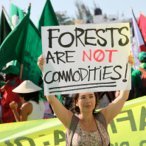English · Español

12 June 2014 | Interviews | Resisting neoliberalism | Forests and biodiversity
Costa Rican indigenous communities denounce imposition of REDD+ projects in the country
A press conference called “Indigenous Voices Against REDD+” will take place in San Jose, capital of Costa Rica on Thursday aiming to express the concern of native communities against the government proposal to impose the REDD+ program in their forests.
The acronym REDD means “Reducing Emissions from Deforestation and Forest Degradation”. It is a mechanism negotiated within the UN and there are plans to implement it in several developing countries, under the excuse of reducing polluting emissions from the destruction of forests.
The press conference is organized by COECOCEIBA – Friends of the Earth Costa Rica, the Kioskos Socioambientales Program of the University of Costa Rica and the Climate Caravan. This Caravan gathers several people that have been travelling since March from Mexico through several Latin American countries, to reach Lima in December where the United Nations will hold their Conference of the Parties on Climate Change.
Real World Radio interviewed the representative of Kioskos Socioambientales, Zuiri Mendez, to know more about this press conference and the reasons behind it. Mendez participated on Wednesday in a meeting with the three organizers of the press conference together with representatives from indigenous communities to think of strategies against REDD+ in the country.
According to information provided by the three organizations, the National Forestry Finance Fund (FONAFIFO) is currently trying to implement –with World Bank funds- an emission offsetting system similar to the Payment for Environmental Services under operation in Costa Rica for several years.
“Through REDD+ they are proposing countries or regions with high levels of pollutant production, and therefore more responsibility for global warming, to compensate the least developed countries or regions to preserve their forests. But is this the solution to climate change? What are the implications for the territories of indigenous peoples?, reads the press release issued for the conference.
Mendez told Real World Radio that the idea is that representatives from several indigenous communities share their experiences in the process of implementation of REDD+ in the country, and how the government has been involved.
And she shared some of the concerns found in indigenous territories: “The communities are misinformed about this issue, only a few people know what REDD+ is and they are questioning the indigenous representatives that got involved in the process since they never informed about their work, who they were negotiating with, and the project´s implications on the territory”.
According to Méndez, there is a small indigenous sector that has been involved since 2008 in the national REDD strategy, and because of this, the government is saying that there is a participatory process. “The communities we´ve visited are concerned because this sector has opened consultation processes, but these were not previous, free or informed, and not all indigenous communities were consulted”. The World Bank and the government plan this “participatory process” to end this year and that REDD+ will be implemented in Costa Rica in 2015.
The indigenous communities left aside “are feeling that REDD+ is a threat that can prevent them from using their forests in their traditional way, using medicines and wood to build their houses”, for instance. They fear the possibility of displacements or limitations to the community use of their forest. “In addition, they are critical of the interests of international financial institutions, such as the World Bank, or transnational corporations , when paying for a conservation service”.
Costa Rica has the experience of the Payment for Environmental Services Program and has promoted itself as a country that creates green mechanisms and promotes sustainability. However, Mendez said that “the result of these processes has been the division of communities, funds have not been delivered equally and organizations close to the government are benefitted, not autonomy processes”. These funds don´t solve serious land tenure problems, but deepen community divisions”. (…) The government “has helped privatize common resources and limits have been imposed to communities so that they don´t use forests as they did”, highlighted the academic representative.
Imagen: Indymedia.org.au







